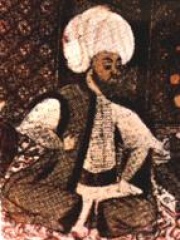
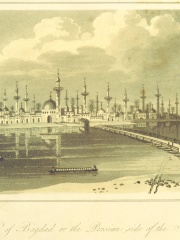
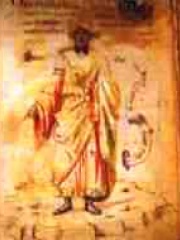

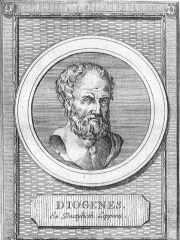



The Most Famous
PHILOSOPHERS from Iraq
This page contains a list of the greatest Iraqi Philosophers. The pantheon dataset contains 1,267 Philosophers, 10 of which were born in Iraq. This makes Iraq the birth place of the 20th most number of Philosophers behind Canada, and Belgium.
Top 10
The following people are considered by Pantheon to be the top 10 most legendary Iraqi Philosophers of all time. This list of famous Iraqi Philosophers is sorted by HPI (Historical Popularity Index), a metric that aggregates information on a biography's online popularity. Visit the rankings page to view the entire list of Iraqi Philosophers.

1. Al-Kindi (801 - 866)
With an HPI of 80.39, Al-Kindi is the most famous Iraqi Philosopher. His biography has been translated into 72 different languages on wikipedia.
Abū Yūsuf Yaʻqūb ibn ʼIsḥāq aṣ-Ṣabbāḥ al-Kindī (; Arabic: أبو يوسف يعقوب بن إسحاق الصبّاح الكندي; Latin: Alkindus; c. 801–873 AD) was an Arab Muslim polymath active as a philosopher, mathematician, physician, and music theorist. Al-Kindi was the first of the Islamic peripatetic philosophers, and is hailed as the "father of Arab philosophy". Al-Kindi was born in Kufa and educated in Baghdad. He became a prominent figure in the House of Wisdom, and a number of Abbasid Caliphs appointed him to oversee the translation of Greek scientific and philosophical texts into the Arabic language. This contact with "the philosophy of the ancients" (as Hellenistic philosophy was often referred to by Muslim scholars) had a profound effect on him, as he synthesized, adapted and promoted Hellenistic and Peripatetic philosophy in the Muslim world. He subsequently wrote hundreds of original treatises of his own on a range of subjects ranging from metaphysics, ethics, logic and psychology, to medicine, pharmacology, mathematics, astronomy, astrology and optics, and further afield to more practical topics like perfumes, swords, jewels, glass, dyes, zoology, tides, mirrors, meteorology and earthquakes. In the field of mathematics, al-Kindi played an important role in introducing Hindu numerals to the Islamic world, and their further development into Arabic numerals along with al-Khwarizmi which eventually was adopted by the rest of the world. Al-Kindi was also one of the fathers of cryptography. Building on the work of al-Khalil (717–786), Al-Kindi's book entitled Manuscript on Deciphering Cryptographic Messages gave rise to the birth of cryptanalysis, was the earliest known use of statistical inference, and introduced several new methods of breaking ciphers, notably frequency analysis. He was able to create a scale that would enable doctors to gauge the effectiveness of their medication by combining his knowledge of mathematics and medicine. The central theme underpinning al-Kindi's philosophical writings is the compatibility between philosophy and other "orthodox" Islamic sciences, particularly theology, and many of his works deal with subjects that theology had an immediate interest in. These include the nature of God, the soul and prophetic knowledge.

2. Al-Ash'ari (873 - 936)
With an HPI of 72.85, Al-Ash'ari is the 2nd most famous Iraqi Philosopher. His biography has been translated into 45 different languages.
Abu al-Hasan al-Ash'ari (Arabic: أَبُو ٱلْحَسَن ٱلْأَشْعَرِيّ, romanized: Abū al-Ḥasan al-Ashʿarī; 874–936 CE) was an Arab Muslim theologian known for being the eponymous founder of the Ash'ari school of kalam in Sunnism. Al-Ash'ari was notable for taking an intermediary position between the two diametrically opposed schools of Islamic theology prevalent at the time: Atharism and Mu'tazilism. He primarily opposed the Mu'tazili theologians on God's eternal attributes and Quranic createdness. On the other hand, the Hanbalis and traditionists were opposed to the use of philosophy or speculative theology, and condemned any theological debate altogether. Al-Ash'ari established a middle way between the doctrines of the aforementioned schools, based both on theological rationalism (kalam) and the interpretation of the Quran and Sunna. His school eventually became the predominant school of theological thought within Sunni Islam. By contrast, Shia Muslims do not accept his theological beliefs, as his works also involved refuting Shia Islam.

3. Al-Jahiz (775 - 868)
With an HPI of 72.52, Al-Jahiz is the 3rd most famous Iraqi Philosopher. His biography has been translated into 45 different languages.
Abu Uthman Amr ibn Bahr al-Kinani al-Basri (Arabic: أبو عثمان عمرو بن بحر الكناني البصري, romanized: Abū ʿUthman ʿAmr ibn Baḥr al-Kinānī al-Baṣrī; c. 776–868/869), commonly known as al-Jahiz (Arabic: الجاحظ, romanized: al-Jāḥiẓ, lit. 'the bug eyed', [al.dʒaː.ħɪðˤ]), was an Arab Muslim theologian, intellectual, and litterateur known for his individual Arabic prose. A polymath who lived during the Abbasid Caliphate, he was the author of works of literature (including theory and criticism), theology, zoology, philosophy, grammar, dialectics, rhetoric, philology, linguistics, and politico-religious polemics. His extensive zoological work has been credited with describing principles related to natural selection, ethology, and the functions of an ecosystem. From about 815 CE, he rose to become one of the literary figures around the Abbasid caliph al-Ma'mun (r. 813–833 CE). Although he held no official posts, he received funding from several Abbasid prime ministers, while also working as a scribe and a teacher. Al-Jahiz was part of the rationalist Mu'tazilite school of theology supported by al-Ma'mun and his two successors, Al-Mu'tasim (r. 833-842 CE) and Al-Wathiq (r. 842-847 CE). Ibn al-Nadim lists nearly 140 titles attributed to al-Jahiz, of which 75 are extant. The best known are Kitāb al-Ḥayawān (The Book of Animals), a seven-part compendium on an array of subjects with animals as their point of departure; Kitāb al-Bayān wa-l-tabyīn (The Book of Eloquence and Exposition), a wide-ranging work on human communication; and Kitāb al-Bukhalāʾ (The Book of Misers), a collection of anecdotes on stinginess. Known for his significant engagement with religious and scholarly texts, Al-Jahiz was one of the earliest Muslims to make use of biblical material in Arabic translation. Tradition claims that he was smothered to death when a vast amount of books fell over him.

4. Abu Yusuf (731 - 798)
With an HPI of 70.34, Abu Yusuf is the 4th most famous Iraqi Philosopher. His biography has been translated into 34 different languages.
Yaʿqūb ibn Ibrāhīm al-Anṣārī (Arabic: يعقوب بن إبراهيم الأنصاري; 729–798), commonly known as Abū Yūsuf, was a prominent Muslim jurist and one of the foremost authorities of the early Hanafi school of Islamic law. He was the leading student of Abu Hanifa and played a decisive role in consolidating, systematizing, and spreading Hanafi jurisprudence throughout the Abbasid Caliphate. Abū Yūsuf also studied under Malik ibn Anas in Medina, which exposed him to alternative legal methodologies and influenced his juristic reasoning. He was appointed as the first Qadi al-Qudat (Chief Justice) under the Abbasid caliph Harun al-Rashid, a position through which he significantly expanded the official adoption of Hanafi law within the state judiciary. Abū Yūsuf is particularly known for his work Kitab al-Kharaj, written at the request of the caliph, which addresses taxation, public finance, and governance in accordance with Islamic legal principles and remains one of the earliest systematic treatises on Islamic fiscal law.
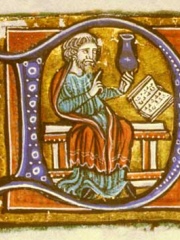
5. Hunayn ibn Ishaq (809 - 873)
With an HPI of 69.59, Hunayn ibn Ishaq is the 5th most famous Iraqi Philosopher. His biography has been translated into 33 different languages.
Hunayn ibn Ishaq al-Ibadi (808–873; also Hunain or Hunein; Arabic: أبو زيد حنين بن إسحاق العبادي; ʾAbū Zayd Ḥunayn ibn ʾIsḥāq al-ʿIbādī; known in Latin as Johannitius) was an influential Arab Nestorian Christian translator, scholar, physician, and scientist. During the apex of the Islamic Abbasid era, he worked with a group of translators, among whom were Abū 'Uthmān al-Dimashqi, Ibn Mūsā al-Nawbakhti, and Thābit ibn Qurra, to translate books of philosophy and classical Greek and Persian texts into Arabic and Syriac. Ḥunayn ibn Isḥaq was his era's most productive translator of Greek medical and scientific treatises. He studied Greek and became known as the "Sheikh of the Translators". He mastered four languages: Arabic, Syriac, Greek and Persian. Later translators widely followed Hunayn's method. He was originally from al-Hirah, previously the capital of the Lakhmid kingdom, but worked in Baghdad, the center of the Translation movement. His fame went far beyond the local community.

6. Diogenes of Babylon (240 BC - 150 BC)
With an HPI of 64.30, Diogenes of Babylon is the 6th most famous Iraqi Philosopher. His biography has been translated into 23 different languages.
Diogenes of Babylon (also known as Diogenes of Seleucia; Ancient Greek: Διογένης Βαβυλώνιος; Latin: Diogenes Babylonius; c. 230 – c. 150/140 BC) was a Stoic philosopher. He was the head of the Stoic school in Athens, and he was one of three philosophers sent to Rome in 155 BC. He wrote many works, but none of his writings survived, except as quotations by later writers.

7. Abu'l-Barakāt al-Baghdādī (1080 - 1165)
With an HPI of 63.32, Abu'l-Barakāt al-Baghdādī is the 7th most famous Iraqi Philosopher. Her biography has been translated into 19 different languages.
Abu'l-Barakāt Hibat Allah ibn Malkā al-Baghdādī (Arabic: أبو البركات هبة الله بن ملكا البغدادي; c. 1080 – 1164 or 1165 CE) was an Islamic philosopher, physician and physicist of Jewish descent from Baghdad, Iraq. Abu'l-Barakāt, an older contemporary of Maimonides, was originally known by his Hebrew birth name Baruch ben Malka and was given the name of Nathanel by his pupil Isaac ben Ezra before his conversion from Judaism to Islam later in his life. His writings include the anti-Aristotelian philosophical work Kitāb al-Muʿtabar ("The Book of What Has Been Established by Personal Reflection"); a philosophical commentary on the Kohelet; and the treatise "On the Reason Why the Stars Are Visible at Night and Hidden in Daytime". Abu'l-Barakāt was an Aristotelian philosopher who in many respects followed Ibn Sina, but also developed his own ideas. He proposed an explanation of the acceleration of falling bodies by the accumulation of successive increments of power with successive increments of velocity. His thought influenced the Illuminationist school of classical Islamic philosophy, the medieval Jewish philosopher Ibn Kammuna, and the medieval Christian philosophers Jean Buridan and Albert of Saxony.

8. Abu Sulayman Sijistani (932 - 1000)
With an HPI of 60.03, Abu Sulayman Sijistani is the 8th most famous Iraqi Philosopher. His biography has been translated into 17 different languages.
Abu Sulayman Muhammad al-Sijistani, (Arabic: أبو محمد سليمان السجستاني) nicknamed al-Mantiqi ('the Logician'; Arabic: المنطقي), c. 912 – c. 985 CE, named for his origins in the Sijistan or Sistan region in present-day Eastern Iran and Southern Afghanistan, was a leading Islamic humanist philosopher in Baghdad. Deeply religious, he regarded both religion and philosophy as valid and true, but separate, concerned with different issues, and proceeding by different means. He thus rejected the claims of the theologians employing Ilm al-Kalam as having built a theology "proved" by rationality and of the Brethren of Purity as offering a synthesis of philosophy and religion. His best-known work is Siwān al-Ḥikma "Vessel of Wisdom", a history of philosophy from the beginning to his own time.

9. Ibn Abi'l-Hadid (1190 - 1258)
With an HPI of 59.06, Ibn Abi'l-Hadid is the 9th most famous Iraqi Philosopher. His biography has been translated into 17 different languages.
‘Izz al-Dīn ‘Abu Hamīd ‘Abd al-Hamīd bin Hībat-Allah ibn Abi al-Hadīd al Mutazilī al-Mada'ini (Arabic: أبو حامد عز الدین عبدالحمید بن أبي الحُسین ھبة الله بن محمد بن محمد بن الحُسین بن أبي الحَدِید المَدائني المعتزلي), also known as Ibn abi'l-Hadid (30 December 1190 – June 1258; 586–656 AH), was a Mutazili Shafi'i scholar and writer during the Middle Ages. He studied under Abu'l-Khayr Musaddiq ibn Shabib al-Wasiti (died AD 1208/605 AH) and is best known for his commentary on the Nahj al-Balagha, which he titled Sharh Nahj al-Balagha.
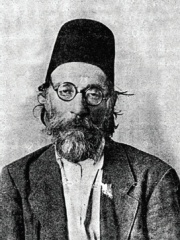
10. Jamil Sidqi al-Zahawi (1863 - 1936)
With an HPI of 57.67, Jamil Sidqi al-Zahawi is the 10th most famous Iraqi Philosopher. His biography has been translated into 18 different languages.
Jamil Sidqi al-Zahawi (Arabic: جميل صدقي الزهاوي, ALA-LC: Jamīl Ṣidqī al-Zahāwī; 17 June 1863 – January 1936) was a prominent Iraqi poet and philosopher. He is regarded as one of the greatest contemporary poets of the Arab world and was known for his defence of women's rights. Born to a Baghdadi family of Kurdish origins, he was educated in various literature and grammar forms translated into Arabic, mastering various languages. He served in various Ottoman administrations and taught philosophy in various regions. Described as a liberal thinker and an "agnostic", he was controversial for his advocation for the adaptation of Western sciences, thoughts, modernism, and national freedom, as well as his stance on women's rights. Al-Zahawi is regarded one of the big three of leading neo-classical Iraqi poets alongside al-Rusafi, and al-Jawahiri.
People
Pantheon has 10 people classified as Iraqi philosophers born between 240 BC and 1863. Of these 10, none of them are still alive today. The most famous deceased Iraqi philosophers include Al-Kindi, Al-Ash'ari, and Al-Jahiz.
Deceased Iraqi Philosophers
Go to all RankingsAl-Kindi
801 - 866
HPI: 80.39
Al-Ash'ari
873 - 936
HPI: 72.85
Al-Jahiz
775 - 868
HPI: 72.52
Abu Yusuf
731 - 798
HPI: 70.34
Hunayn ibn Ishaq
809 - 873
HPI: 69.59
Diogenes of Babylon
240 BC - 150 BC
HPI: 64.30
Abu'l-Barakāt al-Baghdādī
1080 - 1165
HPI: 63.32
Abu Sulayman Sijistani
932 - 1000
HPI: 60.03
Ibn Abi'l-Hadid
1190 - 1258
HPI: 59.06
Jamil Sidqi al-Zahawi
1863 - 1936
HPI: 57.67

